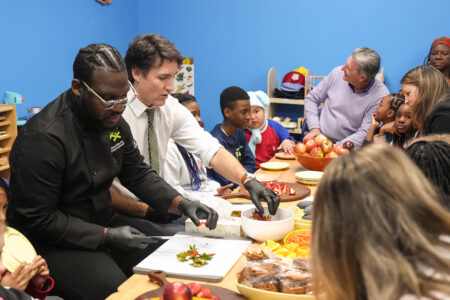
”œI don’t think an inquiry today would be…successful.”
””Peter Desbarats
Anthony Germain: Peter Desbarats, you’ve been in and out of the journal- ism business for quite a few decades now. What’s your assessment of Russell Mills and his decision not to go quietly?
Peter Desbarats: He always struck me as the ideal corporation man in some ways. He didn’t create waves, he was known as a very, very efficient administrator and absolutely not the type of journalist that might have a martyr complex at all. So I was absolutely astonished, personally, that he stepped into the line of fire, that he resigned on an issue of principle, and that he resigned in a way that in fact apparently is going to cost him a bit of money. This is totally out of character, and I think that it lends strength, in fact, to the gesture that he has made.
Anthony Germain: Now, late in the week, the Aspers broke their silence and actually addressed the issue of principles in journalism. Leonard Asper, CanWest’s chief executive offi- cer (CEO), finally spoke publicly about the firing at the Ottawa Citizen, and here’s what he had to say.
Leonard Asper (recorded): I think it’s fair to ask an editor and publisher of a newspaper that, if they’re going to take such a serious position as to change an editorial policy by calling for the resignation of a prime minister, that they would have the common courtesy to call the proprietor of the newspaper, in whose name that state- ment is being made if it is being made in the unsigned editorial space of a newspaper, and consult with the pro- prietor and ask if that is OK. I don’t think that’s too much to ask.
Anthony Germain: Well, Peter Desbarats, is it too much for the owner to ask a publisher to clear sensitive editorials?
Peter Desbarats: Well, I think Leonard Asper’s statement ignores a number of dimensions of the whole sit- uation which are important. First of all, if we were only talking about an indi- vidual newspaper owner and an indi- vidual editor or publisher of that paper, then normally that’s what happens. But in this case, what Leonard Asper always refuses to talk about is the scale of CanWest’s ownership, and that’s what makes this completely different. We now have a media owner in this coun- try, for the first time in our history, that not only owns the largest newspaper chain in the country but one of the largest television networks. And that throws a completely different complex- ion on the discussion of the relation- ship between a media owner and the various editors that may work for him.
Anthony Germain: I just want to be clear on the significance. I mean, so what if they happen to own a gigantic chain of television stations as well? They’re still the owners.
Peter Desbarats: Yes, they’re still the owners, but their ability in this case to influence public opinion in an unprece- dented fashion and to in fact play a major political role in the country because of the influence that they have, if they choose to use it, in fact brings us a little bit close to the kind of media sit- uation where you have the state as the owner of media. It’s almost that large. And this creates a responsibility on the part of the media owner that simply doesn’t exist for an individual owner of one newspaper operating in a competi- tive atmosphere, competing against a number of other owners.
Anthony Germain: Now, when Conrad Black, who, as you know, was no friend of the Liberals…when he was in charge of the Southam chain, it seemed as if the government was almost actually interested in re-exam- ining the entire issue of media owner- ship. Do you think that changed when the Aspers took over?
Peter Desbarats: I think it probably did. I mean, we have to be realistic. The fact that the Aspers are strong support- ers, not only of the federal Liberals but of the prime minister personally, throws a very different light, I think, on the gov- ernment’s attitude to what is happening within that newspaper group. And so there are a number of bodies and a num- ber of individuals who have been asking for a public inquiry. I think we have to be realistic. I don’t think there’s any hope at all that this particular govern- ment under this particular prime minis- ter is ever going to hold a public inquiry into the newspaper holdings of one of its…one of his strongest supporters.
Anthony Germain: Now, I want to talk about the issue of an inquiry in just a moment, but first I know that you used to work for Global, and that also you made presentations on behalf of Global to the CRTC on the Corporation’s behalf…
Peter Desbarats: Yes, I did, to my eternal chagrin.
Anthony Germain: Well, tell me about that?
Peter Desbarats: Well, in fact, they came to me at that time when…their television licenses were up for renewal before the CRTC, and they said they’d noted that over the years I’ve been very pessimistic about the future of newspa- pers, which was true. So they said did I feel, in fact, that newspapers would have a better, more secure future or not as part of a multimedia group like CanWest. And I had to say, I think that they probably did, that standalone newspapers were becoming weaker and weaker and would probably start to dis- appear over the next 10 or 15 years, and probably would have a more secure future, in fact, within something like CanWest. And they said would I be will- ing to say that to the CRTC, and I said yes, and I charged them the usual con- sultant’s fee to do that…
Anthony Germain: I’m sure it was a reasonable fee.
Peter Desbarats: It was a very good fee, in fact, yes….Before the CRTC I posed the question myself: Well, sup- pose they decided to use this power in an unorthodox way to push certain political positions, from a very, very, very important, significant pulpit? I said well, I didn’t think that this was going to happen, and the reason was that we’d had newspaper chains before, although never to this extent and never with this kind of television power at the same time. But we had had large newspaper chains, like the Southam newspaper chain, and they had never used that latent editorial and political power in a unified way to deliberately try and mould public opinion. And they hadn’t done this for very good reasons…it doesn’t really make very much commercial sense for them to do that…and also for journal- istic reasons. So I said if we go by this precedent, it’s unlikely that CanWest and the Aspers are going to use this tremendous power they have in a uni- fied way to try to strongly influence public opinion. And I was totally, totally wrong about that, of course, and I’ve been trying to backtrack ever since. But I’m flabbergasted that they did this. I think what they are doing is not only wrong politically and jour- nalistically, but it’s absolutely self- destructive as far as the CanWest organization itself is concerned.
Anthony Germain: Have you been watching the stocks this week?
Peter Desbarats: Yes, among others. But theirs…theirs have been particular- ly bad, and there are certainly some people in the financial markets, who know more about this than I do, who are now starting to attach the decline in the value of the stocks to the kind of political uproar that the Aspers have created. [Editor’s Note: CanWest Global’s share price recorded a high for the last 52 weeks of $14.25 and a low of $5.40. It traded on the Toronto Stock Exchange in mid-September at about $6.]
Anthony Germain: There have been calls for a public inquiry, and I’m won- dering if you could enlighten us a bit as to what the lessons of the Kent Inquiry were.
Peter Desbarats: Well, the lessons of the Kent Inquiry were that it’s very, very difficult in fact to frame recommenda- tions, which spring from the govern- ment’s concern about a situation in the media, to frame recommendations that aren’t open, even in a very indirect way, to political influence. For instance, we recommended the creation of a press rights panel which would sort of keep an eye on the press, basically. And we were concerned about the possibility of polit- ical interference, of course, so we housed the press rights panel within the Canadian Human Rights Commission and we tried to insulate it as much as possible from government interference. But there’s no way of doing that perfect- ly because what you’re trying to do, in fact, is to use the state to try to protect the public interest. And because it was an imperfect mechanism, we were always a bit vulnerable to the publishers’ claim that this was opening the door to political interference with the press. And we never…never fully resolved that problem, and I don’t think that an inquiry today would be any more suc- cessful in resolving that.
Anthony Germain: But if you had a press rights panel, who would decide who actually gets to sit on that panel?
Peter Desbarats: Well, that’s the key question, of course. Right from the very beginning it has to be appointed by somebody, and it’s going to be appointed by the government.
Anthony Germain: The prime minister.
Peter Desbarats: In effect, yes.
Anthony Germain: Peter Desbarats, thank you very much.







